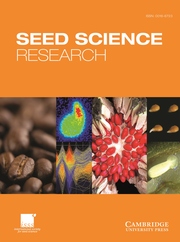Article contents
Dormancy and germination responses of kiwifruit (Actinidia deliciosa) seeds to environmental cues
Published online by Cambridge University Press: 04 October 2016
Abstract
Seed germination of the kiwifruit (Actinidia deliciosa A. Chev. C.F. Liang and A.R. Ferguson), a deciduous, perennial vine, is low because of seed dormancy. The main purpose of this study was to characterize kiwifruit seed dormancy and germination in response to environmental factors such as temperature and light. Dormancy of hydrated seeds is alleviated by the perception of a period at low temperatures (stratification) of at least 3 weeks at 2 or 5°C. Alleviation of dormancy is accomplished by incubation at fluctuating temperatures (20/30°C). A red light pulse did not affect germination, whereas a far-red light pulse strongly inhibited germination. This inhibition was readily reverted by a second pulse of red light, indicating that phytochromes are also involved in dormancy alleviation. Although seed germination was inhibited by the fruit pulp, the latter prevented neither perception of low temperature nor changes in the light sensitivity of the seeds. Therefore, it can be advanced that kiwifruit seeds will only germinate after dispersal if the time–temperature requirement for dormancy alleviation and fluctuating temperatures for dormancy termination are fulfilled. Perception of a closed canopy might interfere with dormancy termination.
Keywords
- Type
- Research Papers
- Information
- Copyright
- Copyright © Cambridge University Press 2016
References
- 8
- Cited by



